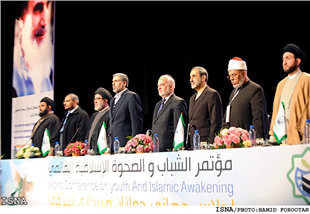Iran Feature: How Tehran's "Islamic Awakening" Lost Its Arab Spring (Worth)
 Robert Worth reports from Tehran for The New York Times:
Robert Worth reports from Tehran for The New York Times:
It was meant to be a crowning moment in which Iran put its own Islamic stamp on the Arab Spring. More than a thousand young activists were flown here earlier this week (at government expense) for a conference on “the Islamic Awakening,” Tehran’s effort to re-brand the popular Arab uprisings of the past year.
As delegates flooded into a vast auditorium next to a space needle in western Tehran, a screen showed images of the Iranian revolution in 1979, morphing seamlessly into footage of young Arab protesters in Tunisia, Egypt, Bahrain, Libya and Yemen.
But there was a catch. No one was invited from Syria, whose autocratic president, Bashar al-Assad, is a crucial Iranian ally. The Syrian protesters are routinely dismissed by Tehran’s government as foreign agents — despite the fact that they are Muslims fighting a secular (and brutal) dictatorship.
That inconvenient truth soon marred the whole script. As the conference began, a young man in the audience held up a sign with the word “SYRIA?” written in English. Applause burst out in the crowd, followed by boos. Audience members began chanting the slogan of the Syrian protesters: “God, Freedom and Syria!” But they were drowned out by others chanting pro-Assad slogans.
Soon afterward, Mahmoud Ahmadinejad, Iran’s president, took the stage to deliver his opening remarks and tackled the subject with his characteristic bluntness.
“We must be vigilant: the West is trying to foment sectarian conflict in our societies, as part of their goal of keeping Israel alive,” he said. “Today Syria, tomorrow your country.”
Those words drew choreographed chants of approval from a claque in the audience. But many participants clearly weren’t buying, and the uprising inside the conference hall seemed to have left its mark. In the afternoon, journalists were barred from the proceedings.
“We were given strict instructions not to say anything about Syria,” said one smirking reporter at a state-run Iranian news agency, during a break.
The conference underscored Tehran’s uneasy position amid the dramatic changes battering the Arab world. In a narrow sense, events have broken Tehran’s way: Islamist parties are coming to power in Tunisia and Egypt and Morocco, and may well do so in Libya, Syria and Yemen.
But Iran’s system of rule by clerics seems very unlikely to prevail in those countries, where the “Turkish model” of electoral democracy and moderate Islam is widely hailed as a goal. Iran’s Shiite faith is also a serious obstacle in a region where Sunni Muslims are the majority, and sectarian tensions are on the rise. And many Arabs still resent Iran’s insurgent attitude toward their governments. As the conference began, the screen in the auditorium showed framed portraits of dictators falling, domino-style: first the Tunisian president, Zine el-Abidine Ben Ali, then Hosni Mubarak, Col. Muammar el-Qaddafi and Ali Abdullah Saleh of Yemen. But the falling dominoes continued: the still-ruling kings of Jordan, Saudi Arabia and Bahrain all went down, to swelling orchestral music.
The Tehran conference coincided with fresh signs of division between Iran and other Muslim countries. On Sunday, Turkey hosted a conference of the Syrian opposition, whose members denounced Iran’s assistance in the Syrian government’s crackdown on protesters. And on Tuesday, a Saudi delegation walked out of a pan-Islamic conference in Indonesia, after a former speaker of Iran’s Parliament, Nateq Nouri, said the Saudi monarchy was corrupt and oppressive. (Needless to say, there were no Saudis at the Tehran conference.)
The Iranian effort to hold up the struggle against Israel as an all-powerful crucible of Islamic unity comes across to many Arabs as doctrinaire and shop-worn, no matter how strongly they sympathize with the Palestinian cause.
The cast of characters presiding over the Tehran conference — seated at a table on the stage — seemed strangely removed from the events of the past year: gray-bearded clerics, a former prime minister of Iraq, and aging Islamist leaders from Hezbollah and a Palestinian faction.
During a news conference with Ali Akbar Velayati, an adviser to Iran’s supreme leader, Ayatollah Ali Khamenei, a Jordanian reporter asked how to tell a real revolution from a foreign conspiracy, in a tone that seemed almost tongue in cheek.
“Good question,” Mr. Velayati said. The answer was simple: “One of them favors the United States and the Zionists, and the other is against it.”

 Friday, February 3, 2012 at 7:43
Friday, February 3, 2012 at 7:43
Reader Comments